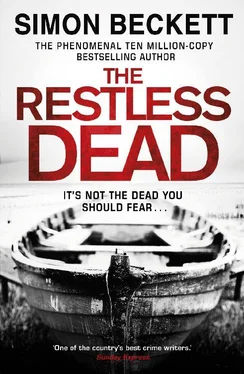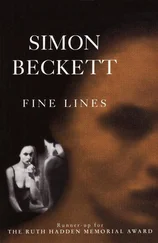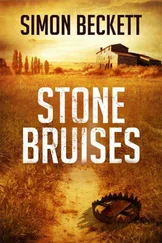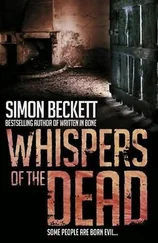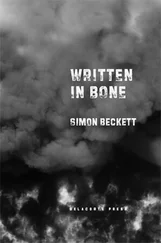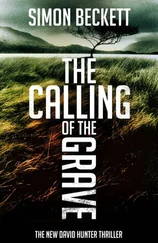‘It’s some sort of fabric. Could be a coat.’
I glanced at Lundy. He raised his eyebrows but said nothing as more of the object emerged. A section of dark cloth was revealed, and with it came a noticeable smell of decomposition.
‘Something’s wrapped in it,’ the same female CSI said. ‘Hang on... Oh.’
‘What is it?’ Lundy asked, trying to peer past her into the grave.
‘Fur. It’s an animal,’ she said, sounding disappointed. ‘Looks like a dog.’
The tension was snuffed out as though a switch had been thrown. Lundy’s sigh could have been disappointment or relief. ‘Right, well, let’s have a look at the rest of it. And make sure there’s nothing hidden underneath. I’ve known some crafty buggers try to pull that before now.’
So had I. The DI motioned with his head for me to go over. Pulling off my mask, I went and stood with him a few paces away from the grave.
‘Villiers’ beagle,’ he said, looking back at the dirty coat of tan and white fur the CSIs were uncovering. ‘He had it put down just before he disappeared.’
I nodded, remembering him telling me that the vet had been the last person to see Leo Villiers. At least that we knew of.
‘He must have been fond of the dog if he buried it himself,’ I said. Most people let the vet dispose of their pet’s remains.
‘He’d had it since he was a teenager, by all accounts. The vet said he was “visibly distressed” when it was destroyed. Even she was surprised, but it seemed to fit in with the suicide theory. Final straw, sort of thing.’ Lundy looked back at the grave again, his moustache turning down in disapproval. ‘That’s one death he didn’t fake, at least.’
‘Do you want me to stick around until they’ve made sure there’s nothing else buried in there?’
He shook his head. ‘No, I think we’ve found all we’re going to. Sorry for the false alarm. You might as well get back to the mortuary. The sooner we know who we fished out of the estuary, the better idea we’ll have of what’s going on.’
I pulled off my gloves, careful not to strip the sticking plasters off with them. I’d got changed for nothing, but that was how it went sometimes. ‘Could it be someone else local?’
‘Not that we’re aware of. The only two people reported missing from round here are Emma Derby and Leo Villiers, and we know it’s neither of them.’
‘Whoever he was, he was probably still in his twenties,’ I said. ‘The hammertoes on the foot are misleading. Whatever caused them wasn’t age related. He was an adult, but from the condition of the bones I’ve seen so far I’d say he was almost certainly under thirty.’
I’d been deliberately selective in which bones I’d taken from the detergent, concentrating first on those I thought would yield the most information. The ends of the sternal ribs change with age and so does the auricular surface of the ilium on the pelvis, both becoming rougher and more porous over time. I’d found some coarsening but no porosity in any of the bones I’d seen, and while I’d still need to carry out a much more thorough examination, I was confident my estimate wasn’t far out.
‘A fair bit younger than Leo Villiers, then,’ Lundy said. ‘That helps, but have you got anything else? As things stand we don’t even know if who we’re looking for was white or black.’
I’d been trying to determine that myself, without much success. People are every bit as complicated in death as they are in life, and determining ancestry was notoriously tricky even in intact remains.
Skin colour can be misleading, and changes anyway once a body begins to decompose. Death is the great leveller, turning pale skin darker and vice versa. There are some skeletal characteristics that point to one genetic background or another, but even these can’t always be relied on.
These remains were a case in point. When everyone thought the body was that of Leo Villiers, the assumption was that it must be white. Now even that couldn’t be taken for granted. There was also another problem. Most ancestral characteristics are found in the skull, but the one belonging to the body recovered from the Barrows had been damaged by the shotgun blast. Not only was the mandible missing, but the upper jaw bone below the nasal cavity, which would once have housed the front teeth, had been broken off in a splintered arch. Only broken stumps of back molars and empty sockets remained, not enough for even a forensic dentist to help with.
‘What’s left of the nasal bridge doesn’t project very far, which suggests possible black or Asian ancestry,’ I told Lundy. ‘But the eye orbits are more angular than rectangular or rounded, which is more of a white characteristic.’
‘So he could be mixed race?’
‘Possibly. Or he might just have had distinctive facial features.’ I shrugged. ‘Sorry I can’t be more help.’
Lundy puffed out his cheeks. ‘Well, it gives us a bit more to go on. Although if he was mixed race...’
‘What?’ I prompted.
But he shook his head. ‘Just thinking out loud. Come on, I’ll see you back to your car.’
We’d only gone a few steps when Lundy’s phone rang. He stopped to answer it, and I saw his expression change.
‘Here now, you mean?’ Whatever was said at the other end didn’t reassure him. The heavy shoulders slumped. ‘Christ. OK, then.’
He put his phone away.
‘We’ve got company.’
Sir Stephen Villiers wasn’t on his own. There was no senior policeman with him this time, but to make up for it he was accompanied by three lawyers, two of them middle-aged men in expensive but conservative suits and the third a woman whose matt-black hair betrayed a bad attempt to dye it. All three walked slightly behind him in unconscious order of deference, the eldest lawyer just by his shoulder, with the other man and the woman each a half-step further back. As they advanced towards us over the lawn the effect was like watching a mother duck trailed by her brood. Albeit much more predatory.
I’d told Lundy I’d go back to the mortuary, expecting he’d want to speak to Leo Villiers’ father by himself. The DI nodded, distracted, but then called me back.
‘On second thoughts, Dr Hunter, can you stick around for a bit? If you don’t mind, it might help to have you here.’ He arranged his features into an affable smile as the group bore down on us. ‘Can I help you, Sir Stephen?’
‘Where’s your senior officer?’
The voice was like ice. Leo Villiers’ father was dressed as impeccably as before, a mid-grey cashmere coat over a darker grey suit. Everything about him was precise, from the closely trimmed fingernails to the parting in the slightly thinning hair. But the hair was already being ruffled by the stiff breeze blowing from the sea, and underneath the controlled demeanour was a sense of fury barely held in check.
‘Not here at the moment,’ Lundy told him. ‘Was she expecting you? If she knew you were coming, I’m sure she’d have—’
‘I want you off my property.’
Lundy’s eyebrows went up. ‘I was under the impression that this was your son’s house. Have I got that wrong?’
The most senior lawyer hurriedly cut in. ‘The house and its grounds are part of the Villiers estate. I suggest you leave straight away or you’ll be facing charges of harassment and illegal damage.’
‘Well, we wouldn’t want that,’ Lundy said equably. ‘We do have a warrant to search the property, though. I thought you’d seen it, but if you like I can—’
‘We don’t recognize the warrant’s validity. It’s been issued on entirely spurious grounds, for no other reason that I can see but to cause unnecessary emotional suffering to a bereaved father.’
Читать дальше
